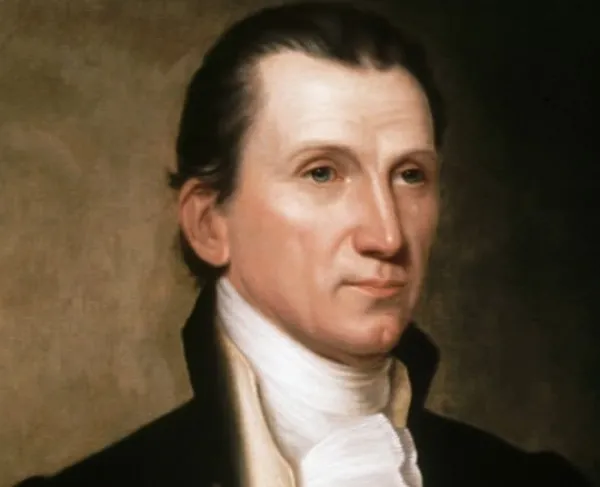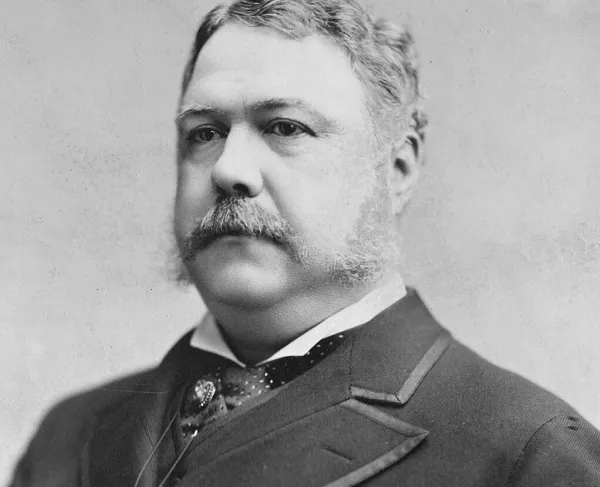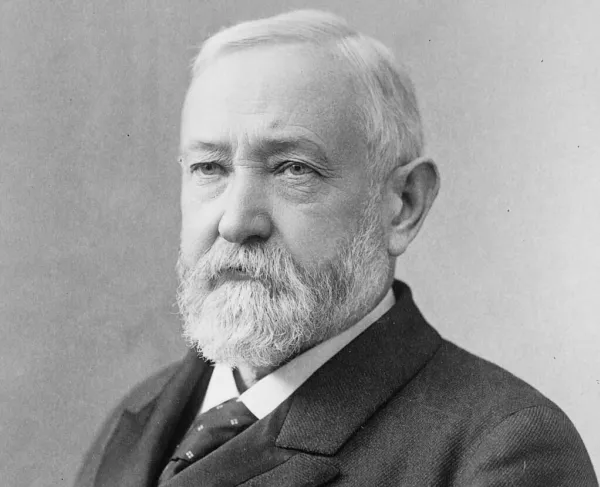James Monroe

James Monroe, the last of the “Founding Father presidents,” was born on April 28, 1758, in Westmoreland County, Virginia. Born to Spence Monroe and Elizabeth Jones, his family was made up of patriots. His father joined the Northern Neck Farmers in 1766 in protest of the Stamp Act, his uncle Joseph Jones was a member of the Virginia House of Burgesses and was close friends with George Washington, Thomas Jefferson, and James Madison. Monroe looked up to his uncle a great deal and would later base his political identity on that of his uncle.
Monroe first attended school at the age of eleven. It was at Westmoreland County’s only school that he met his lifelong friend, and future chief justice of the Supreme Court, John Marshall. By the age of sixteen, Monroe lost both of his parents, and Joseph Jones became his adopted father. Jones took an active role in his nephew’s life. In 1774, Jones took Monroe to Williamsburg and enrolled him in the College of William and Mary. A year and a half after his enrollment, the War for Independence erupted between colonial and British forces. The future president dropped out of college and joined the Continental Army. As Monroe was literate, healthy, and a good shot, he was made a lieutenant.
The lieutenant first saw action in the New York and New Jersey campaign. Along with several hundred Virginians, Monroe went to support Washington’s army in its nearly disastrous retreat from New York City. Monroe took part in the famous December 1776 crossing of the Delaware River and the surprise attack on the Hessians in Trenton. Monroe suffered a severe injury during the skirmish when a musket ball hit him in the shoulder. Monroe would have died, had it not been for a doctor, who tied his severed artery immediately after the wounding. For his bravery in the campaign, Washington made Monroe a captain. After the New York and New Jersey campaigns, Monroe returned home to recruit.
The 18-year-old captain returned to the continental army in August 1777 as an aide to Lord Stirling (William Alexander). He saw action at Brandywine Creek, where he tended to a wounded Marquis de Lafayette. Monroe was once again promoted to major and Stirling’s aide-de-camp. Monroe was present during the harsh winter at Valley Forge, where he shared a hut with his childhood friend John Marshall. Monroe was present at the Battle of Monmouth. He continued to serve under Washington through the summer and fall of 1778, but likely due to self-financing his service, he was forced to return home and resign. However, in the spring of 1779, after letters of recommendations from Washington and Alexander Hamilton, Monroe received a commission as a lieutenant colonel. With his position, the Virginia Assembly promised to provide troops for him to lead; however, the Assembly could not raise a militia resulting from inadequate resources. Instead, he received a position as an aide to then Governor of Virginia, Thomas Jefferson. Jefferson, in charge of Virginia’s militia, promoted Monroe to the rank of colonel. Jefferson ordered him to establish communications between the southern army and the government of Virginia. Monroe continued to seek a command, but there was an abundance of commanders and Virginia had no excess of money, and as a result, Monroe could not participate in the Yorktown campaign.
After the war concluded, Monroe continued to study law under Jefferson. Monroe was not particularly interested in law; however, the young veteran knew law offered the most possibility for power and wealth within the budding nation. In 1782 he was elected to the Virginia House of Delegates and in 1783 was elected to the Congress of the Confederation. Even during his early political career, Monroe advocated for western expansion and protection, the policy positions which would dominate his presidency. While a member of the congress Monroe toured the western American territories and used his experience to amend and enact the Northwest Ordinance, organizing the region of the United States. Monroe was opposed to the Constitution, as it gave the national government taxation power, and he voted against the final document. Despite Monroe’s opposition, the Virginia ratifying committee ratified the Constitution.
During the elections for the First Congress, Monroe ran for a senate seat against his close friend, James Madison. Madison and Monroe did not let political animosity destroy their friendship, and often traveled with each other. Madison prevailed, and Monroe lost the election, but after the death of Senator William Grayson, less than a year after the establishment of Congress, Monroe was elected to serve the remainder of Grayson’s term.
In 1792 Monroe came into conflict with Secretary of the Treasury Alexander Hamilton. During an investigation into the misuse of federal funds, Monroe found evidence that a co-conspirator in the plot, James Reynolds, received payments from Hamilton. Monroe, believed that Hamilton had been involved in the plot and prepared a comprehensive report of the crime; however, before publishing the story, he brought the evidence to Hamilton. Hamilton then confessed to what became the “Reynolds Affair.” Hamilton had not been stealing money from the government but instead had been having an affair with Reynold’s wife, Maria. Monroe believed Hamilton and promised to keep the scandal under wraps. However, a secretary working for Monroe sent the investigation to a scandal writer, making the issue public. This publication nearly brought Monroe and Hamilton to a duel; however, the senator’s second, Aaron Burr, negotiated a truce. Burr called the dispute, “childish.”
As political tensions between Jeffersonian Democratic-Republicans and Hamiltonian Federalists exploded, Monroe stood with his friend and fellow Virginian, Jefferson. As the Democratic-Republicans had vigorously supported the French Revolution, in 1794 Washington, hoping to capitalize on Monroe’s French allegiance, sent Monroe to be the ambassador to France. As an ambassador, Monroe protected American trade, released Thomas Paine, whom French revolutionaries arrested during their own revolution because of French leadership’s unwillingness to acknowledge his American citizenship, and secured US navigation rights on the Mississippi River.
Monroe’s time as ambassador came quickly to an end after the US negotiated the Jay Treaty. No one in the Federal government provided Monroe with the details of the deal, and when it was published, the specifics outraged the French and Monroe. The ambassador was also angered by the fact that George Washington withheld the details from him; this division between old friends destroyed their relationship. In 1796, frustrated with Monroe’s opposition, Washington removed him from the position of ambassador for “incompetence.” Monroe later wrote a lengthy defense of his time in France and criticized the Washington government for growing closer with the British.
In 1799 Monroe was elected governor of Virginia. As governor Monroe increased state involvement in education and transportation, he also invested in the state militia. He supported the candidacy of Thomas Jefferson in 1800, by appointing election officials favorable to Jefferson to ensure his presidential victory. Jefferson capitalized on this support and Monroe’s ambassadorial past, by sending him to France to assist in the Louisiana Purchase. While negotiating, Jefferson made Monroe the ambassador to Britain. Jefferson gave orders to purchase only West Florida and New Orleans for at most nine million dollars, Monroe disobeyed Jefferson and bought all of Louisiana for fifteen million dollars. Monroe’s actions did not anger Jefferson; rather he was very pleased with the purchase, the president even offered Monroe the position of the first governor of the new territory, he declined and remained in Europe to continue as ambassador to the British. In 1806 Monroe negotiated the Monroe-Pickney treaty, which would extend the Jay Treaty, which ironically Monroe had opposed a decade earlier, Jefferson who strongly opposed the Jay Treaty also opposed the Monroe-Pickney deal, and it was as a result never ratified. This failure allowed tensions to grow over the following six years, leading to the War of 1812.
Though some members of the Democratic-Republican party wanted to run Monroe for president in 1808, Jefferson and Madison pressured Monroe to put his presidential aspirations on hold. This coercion deeply disappointed Monroe, and though he quickly reconciled with Jefferson, Monroe and Madison would not even speak, again, until 1810. In 1811 Monroe was once again elected the governor of Virginia, however, in April of that year, Madison appointed him Secretary of State forcing him to leave the gubernatorial position. By selecting Monroe, Madison sought to quell instability within the party, along with reconciling with his former friend. As Secretary of State Monroe worked diligently to prevent the practice of impressment, he found progress with the French, however; the British would not negotiate and in 1812 Monroe joined Henry Clay and the “War Hawks” and called for war. Madison followed Monroe’s advice, and the War of 1812 began.
The War of 1812 cemented Monroe into the public eye as a leader. Monroe served as Secretary of State, where he sent John Quincy Adams to negotiations in Ghent. In 1814 Madison made Monroe Secretary of War, and Monroe resigned from his position as Secretary of State, but Madison never appointed a new Secretary of State, and as a result, for a brief time, Monroe served a joint role as both Secretary of State and Secretary of War.
After the war concluded in 1815, Monroe decided to run for president in 1816. Monroe had become a hero through his leadership in the war. Monroe won the presidency with an electoral vote of 183 to 34.
Monroe, as president broke with tradition and built his cabinet, not through hard party lines but instead based on whom he believed would execute each role successfully. Which partly resulted in the Federalist Party falling into obscurity while Democratic-Republicans did not act in lockstep. The adjournment of national political identities created what is often known as “the era of good feelings.” Many “good feelings” did characterize Monroe’s presidency, especially regarding land acquisition, the president acquired Florida through the Adams-Onis Treaty, along with settling border disputes in the north and the Oregon territory. However, it was not all good feelings in the era of Monroe; in 1819, America had its first economic crisis, “The Panic of 1819.” Monroe used infrastructure projects to bolster the economy while also remaining within the structure of the Constitution.
Along with economic panic, Monroe’s presidency saw the beginnings of sectional divisions over the expansion of slavery as the new lands acquired in the years since the signing of the Constitution were formed into territories, which were now eligible for statehood. When Missouri sought statehood as a slave state, many believed the balance of power between free and slave states would shift in favor of slave states. The solution to the issue was the Missouri Compromise. The compromise admitted Missouri as a slave state and Maine as a free state to continue the balance of power, while also dividing unorganized territories between north and south.
Monroe’s most lasting legacy is his “Monroe Doctrine.” Monroe and his secretary of state John Quincy Adams had grown increasingly frustrated with European intervention in Latin America as many former colonies in Latin America became independent states, Monroe and Adams prepared a speech for the State of Union espousing a new ideology for America, the “Monroe Doctrine” as it came to be known by the 1850s. The Doctrine decreed that if European powers sought colonization within the American continents, that it would be perceived and not only an attack on the free independent peoples of that state, but on America as well. This Doctrine had little to no effect on the world during Monroe’s time. America did not yield much political or war powers and as a result, it extensively ignored by European powers and minorly appreciated by Latin American states. However, Monroe’s Doctrine would be repeated by US president long into the future. President James K. Polk used the Doctrine to justify Manifest Destiny, and the proliferation of a war with Mexico. Ulysses S. Grant used the Doctrine to replace European influence in Latin America, under President James Garfield, the Monroe Doctrine introduced the US as a “big brother” to Latin American countries. President Teddy Roosevelt added his “Roosevelt Corollary” to the Doctrine, to justify US imperialism into Latin America. Even President John F. Kennedy cited the Doctrine during the Cuban Revolution. The Monroe doctrine was not just Monroe’s personal foreign policy but became the prevailing American ideology regarding Latin America.
Monroe was the last president to serve in the War for American independence, and his presidency saw America truly becoming its own country. America began to consolidate its expansion, fight against future colonization, and even grapple with its issue of slavery. Monroe would be remembered three times fighting for independence—in the revolution, in the War for 1812, and in the Monroe Doctrine.





